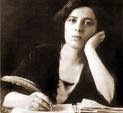
I've just finished reading Carol J. Adams' The Pornography of Meat ; an eco-feminist analysis linking the low status of women in society with our abominable treatment of animals we farm for food.
Written in 'accessible', non-academic language, Adams' book is an engaging read - if a little confronting. The Pornography of Meat not only discusses groups who Adams sees as oppressed, but it also serves as a wake-up call regarding the invisible privileges of whiteness, maleness, and humanness.
Adams uses anecdotes, statistics, and visual images ranging from restaurant menus, advertisements, and pornography, as well as graphic photographs from abattoirs and factory farms to illustrate her point.
In The Pornography of Meat, the layout of text and images is subtly timed for maximum impact. A large text ad screams: 'Live Nude Lobsters', while Adams informs us that, “pleasurable consumption of consumable beings is the dominant perspective of our culture.” The 'tasty chick' burger ad pops up a few pages later, alongside Adams' thoughts on strip clubs and the objectification of women.
This link between The 'othering' of women with the 'othering' of animals, is fully brought home with the image of the 'turkey hooker', an ad featuring a ludicrously sexualised cooked bird wearing high-heels and striking a 'come thither' pose. Women's bodies, Adams' images tell us, have become symbolically aligned with meat products. The plight of women and the plight of animals is one and the same.
The symbolic connections between women and animals may seem fairly obvious. After all, it is quite common and socially acceptable for women to be called by all kinds of animal names; ie, (sex) kitten, (playboy) bunny, and chick, as well as less desirable, but still commonly used names like dog, bitch and cow.
While the above images and language may be socially acceptable - seen by some as light-hearted, jokey, 'no big deal' - other images in this book bring to light sinister aspects of patriarchal naming. For example, a cover from Hustler magazine showing a woman being put through a meat grinder, or a picture of a naked woman's body divided up into portions labelled 'rib', 'loin', 'rump', and 'chuck'.
By the time I've seen these pictures and read the accompanying text, the take-away chicken outlet back in Hobart with the mysteriously sexualised name and logo, Legs 'n' Breasts is seen in another light, and I shudder to remember how another popular Tasmanian fast-food chain, Nando's, inexplicably featured a pole dancer in one of its advertisements.
Unfortunately, The Pornography of Meat is written with more passion and good intentions than care and skill. Adams is often repetitive, and many of her sentences are poorly constructed. For example, on the subject of slavery-themed pornography, she writes, “They posit that black women have an animalistic sexuality that must be controlled, otherwise they are dangerous.” The clunkiness of this sentence risks obscuring the relevance of Adams' message. Clumsy syntax is not the worst crime in the world (it's not as bad as clubbing a baby seal, for example) but it is disappointing. Adams' ideas are more powerful when she makes the effort to express herself eloquently.
Also troubling, are Adams' rather large generalisations about men and women. For example, she writes, “Men talk about women... as sexually active and available to them; a piece of ass, or a whore... Men with other men look and talk about women" and, "By body chopping a woman, a man can position himself as a successful sexual predator in the eyes of his peers.” One could be forgiven for thinking that Adams believes that all men watch porn, enjoy killing animals, and are responsible for endless exploitation and subordination of women and animals. On one level, I respect Adams' hard-core stance, while on another, I feel she would reach more people by being less essentialist and more open to varying interpretations of gender.
Overall though, The Pornography of Meat is well worth a read. Adams' ideas are poignant , far-reaching, and highly relevant. If at some stage you feel as though you are being brainwashed, remember that in the end, it is a far less harmful brainwashing than the usual kind one is subjected to. Just think of prime-time television's latest stellar representation of gender, Beauty and the Geek: where beautiful women in bikinis are matched with brainy, yet ugly, men, or, the Bachelor where desperate, lonely, women subject themselves to countless emotional agonies all in the name of love, wedding bells, and reality television. And then of-course there's that wonderful Nando's chicken ad I mentioned, where an erotic-dancer slides up and down a pole in an effort to sell some fried chicken.
Adams' militant vegan eco-feminism will look pretty mild in comparison.









